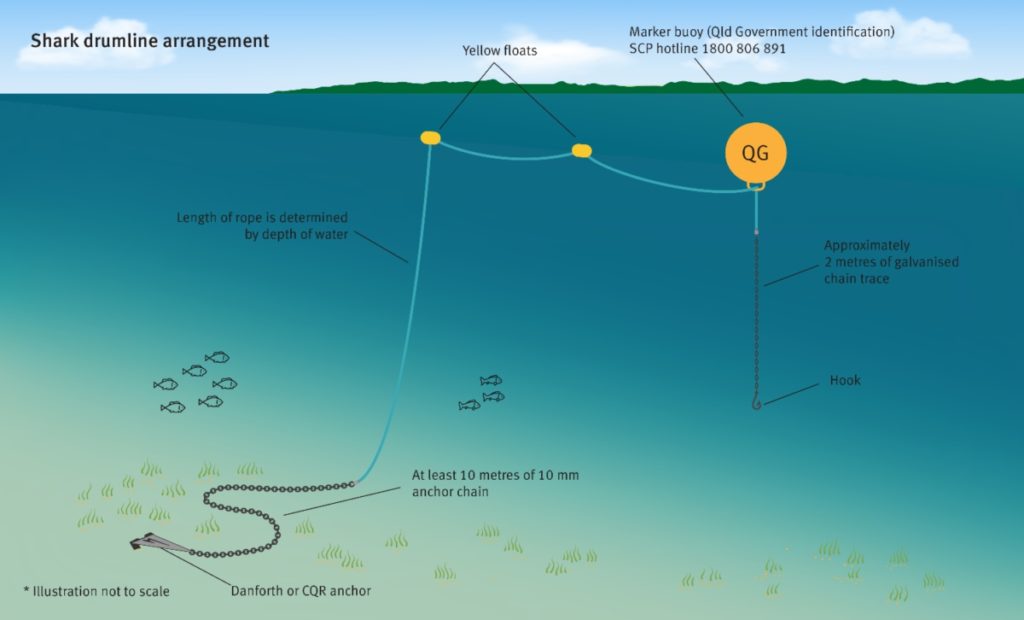The Queensland Government has committed extra funds to research new technology for shark control to keep swimmers safe.
Fisheries Minister Mark Furner said an additional $17.1 million would be spent over four years on shark control, with $1 million a year going towards research.
In the Bundaberg Region, drumlines are used at Oaks Beach, Nielson Park, Bargara and Kellys Beach.
Drumlines catch actively feeding sharks using fresh, natural bait attached to shark fishing hooks suspended from a large plastic float, which is anchored to the sea bed.
According to the Department of Agriculture and Fisheries, equipment is serviced every second day by independent contractors who work under Queensland Boating and Fisheries Patrol supervision, weather permitting.
All fishing equipment is removed from the water for maintenance and replaced with fresh equipment at least once every 21 days.
Contractors also assist with collaborative research projects and provide a 24-hour, seven-day service in case of emergency.
Shark nets are used at some Queensland beaches, although they’ve been cricitised for having an adverse impact on marine life.
Nineteen turtles were caught in the Rainbow Beach shark net in 2018.
The Bundaberg Region drumlines have caught 14 sharks so far this year while 53 were caught last year.
Mr Furner said Queensland’s shark control program has been operating since 1962 and there has only ever been one shark-related fatality at a protected beach since.
Meanwhile, legal action to permit the ongoing use of drumlines to catch sharks off popular Great Barrier Reef swimming spots continues.
The Federal Court Appeal in August will hear the Queensland Governments’ objections to a ban on the practice ordered by the Administrative Appeals Tribunal.
The ban was sought by the Humane Society International.

Conservation groups oppose shark nets
Conservation group Sea Shepherd is one of the environmental organisations that opposes the use of shark nets and drumlines.
Shark control programs cost states millions of dollars a year,” Sea Shepherd says in a submission.
“This includes the salary for observers and shark technicians, shark control equipment (dolphin pingers and whale alarms, etc) and an allocation for undertaking compliance audit activities.”
Sea Shepherd says shark control is contrary to environmental protection legislation.
“Overall, 54 species of sharks have been caught on the drumlines and in shark nets in Queensland, most of which are not a threat at all to ocean users,” the submission says.
“Over 26,700 marine animals, including rays, turtles, fish, dugongs, dolphins and whales, some of which have Federal protections, have been caught by the program.
“The species involved in the by-catch include over 5000 turtles, 1014 dolphins, nearly 700 dugongs and 120 whales – all of which are federally protected marine species.”
Mr Furner said the Queensland Government “will always put the safety of human lives first”.
“I understand many people have strong views about shark control,” Mr Furner said.
“We have listened to those views and have committed $1 million a year to trial alternatives that may be appropriate for Queensland.
“However, until an effective alternative is found, we are resolved to continue to back-in the shark control program with its combination of shark nets and drumlines at all of Queensland’s most popular beaches.”
Mr Furner said part of the additional funding in Tuesday’s Budget would support research into new swimmer safety technology, such as using drones to monitor targeted stretches of coastline.
“Trials of alternatives will be informed by the scientific working group and a review of the effectiveness of other technologies currently being undertaken by Cardno, a leading engineering, environment and design consultancy,“ Mr Furner said.
“There will also be continuing swimmer education about the dangers posed by sharks.”
Shark safety tips
- Don’t swim at dawn or dusk
- Always swim in clear water (not in murky water, busy anchorages, estuary mouths or canals)
- Don’t throw food scraps or fish waste overboard (including in anchorages or where people are swimming)
- Don’t swim where fish are being cleaned
- Swim, surf, snorkel or dive with a buddy
- Follow local signage and swim between the flags at patrolled beaches.
- Marine park conservation zones could be extended
- Kellys Beach closed after shark sighting




